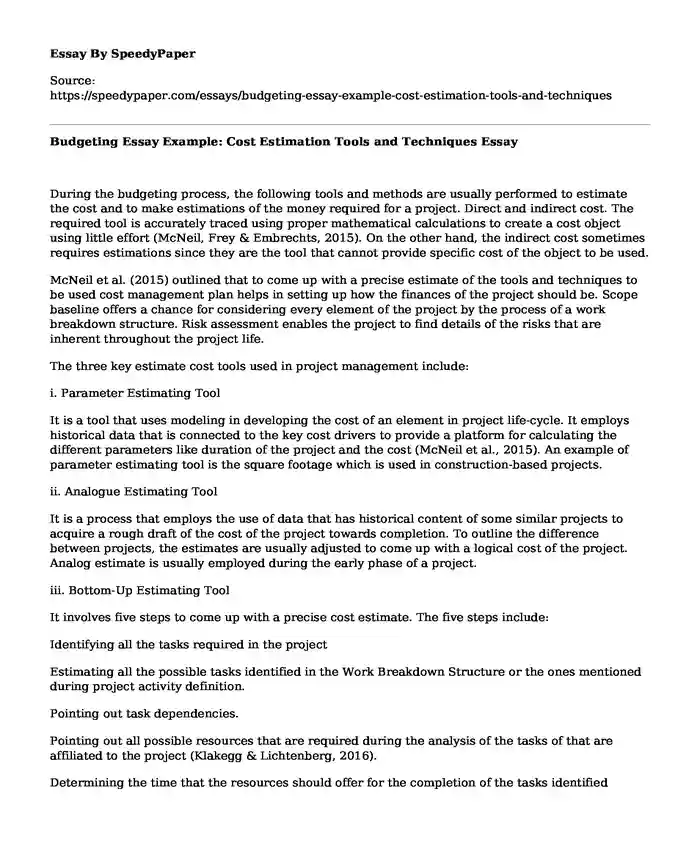During the budgeting process, the following tools and methods are usually performed to estimate the cost and to make estimations of the money required for a project. Direct and indirect cost. The required tool is accurately traced using proper mathematical calculations to create a cost object using little effort (McNeil, Frey & Embrechts, 2015). On the other hand, the indirect cost sometimes requires estimations since they are the tool that cannot provide specific cost of the object to be used.
McNeil et al. (2015) outlined that to come up with a precise estimate of the tools and techniques to be used cost management plan helps in setting up how the finances of the project should be. Scope baseline offers a chance for considering every element of the project by the process of a work breakdown structure. Risk assessment enables the project to find details of the risks that are inherent throughout the project life.
The three key estimate cost tools used in project management include:
i. Parameter Estimating Tool
It is a tool that uses modeling in developing the cost of an element in project life-cycle. It employs historical data that is connected to the key cost drivers to provide a platform for calculating the different parameters like duration of the project and the cost (McNeil et al., 2015). An example of parameter estimating tool is the square footage which is used in construction-based projects.
ii. Analogue Estimating Tool
It is a process that employs the use of data that has historical content of some similar projects to acquire a rough draft of the cost of the project towards completion. To outline the difference between projects, the estimates are usually adjusted to come up with a logical cost of the project. Analog estimate is usually employed during the early phase of a project.
iii. Bottom-Up Estimating Tool
It involves five steps to come up with a precise cost estimate. The five steps include:
Identifying all the tasks required in the project
Estimating all the possible tasks identified in the Work Breakdown Structure or the ones mentioned during project activity definition.
Pointing out task dependencies.
Pointing out all possible resources that are required during the analysis of the tasks of that are affiliated to the project (Klakegg & Lichtenberg, 2016).
Determining the time that the resources should offer for the completion of the tasks identified during the initiation of the project and the ones outlined in the work breakdown structure.
Since WBS decomposes all the tasks required during the project life, the decomposed project tasks which are made to be in smaller activities and made to be more manageable are possibly used applied in estimating the duration and cost of the work (Klakegg & Lichtenberg, 2016). When considering the resources, the project managers usually think about the number and type of the resource to be used. Availability of the resource is also employed in calculating the cost of the instrument used and using the expenses that are connected to the resource (Klakegg & Lichtenberg, 2016). The value is usually in the form of transport cost, cost duty calculated on the item and the price of damages that may be incurred during transportation.
Top-down estimation technique, therefore, offers a chance for the project managers to estimate the cost of all the task by starting with the overall cost of the project towards the specific expenses like transport cost, deliverables and damages possible during the transportation of the facilities. Top-down cost estimate approach focuses on completing the project within the allocated time.
References
McNeil, A. J., Frey, R., & Embrechts, P. (2015). Quantitative risk management: Concepts, techniques and tools. Princeton university press.
Klakegg, O. J., & Lichtenberg, S. (2016). Successive cost estimation-successful budgeting of major projects. Procedia-Social and Behavioral Sciences, 226, 176-183.
Cite this page
Budgeting Essay Example: Cost Estimation Tools and Techniques. (2022, Jun 10). Retrieved from https://speedypaper.com/essays/budgeting-essay-example-cost-estimation-tools-and-techniques
Request Removal
If you are the original author of this essay and no longer wish to have it published on the SpeedyPaper website, please click below to request its removal:
- Health Care Professional Essay Example
- Landlord Tenant Law - Learn More from Our Free Essay
- The Theme of Love in Romeo and Juliet | An Essay Sample for Students
- HRM Essay Sample about Employment Strategy
- Essay Sample on The Wilsonian Movement
- Paper Example. Effects of Acid Rain on the Environment
- Paper Example - State vs. Federal Taxes on Businesses
Popular categories





